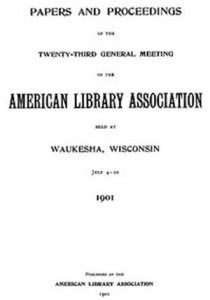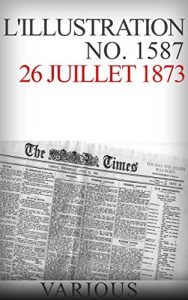In your presence, and in addressing you to-night as presiding officer, I feel to a far greater extent than I can express in words the high honor that has been conferred in each instance upon all who from time to time have been chosen to serve as a president of this particular association. There is in this present age, to be sure, no lack of those popular and peculiar entities termed associations?associations of many kinds, and for almost every conceivable purpose. Throughout the entire continent there exist few, perhaps none, whose history, objects, and work, have warranted a more justifiable pride in being a member thereof, than is found in being a member of the American Library Association. It may here be said that conditions and circumstances have been favorable to the success of the A. L. A.; not the least of which has been the faithful loyalty of its individual members. We realize, too, that even time has dealt leniently with it, upon noting that of the 64 members who attended its first meeting, held at Philadelphia twenty-five years ago, but 18 have died, and that 20 persons are yet included in its membership list out of the 69 who joined the association in 1876, that initial year. Some of that original number, much to our gratification, are present with us at this 23d general meeting. Considering its purely voluntary nature, the migratory holding of its successive meetings in different parts of the land, and the notable avoidance of fads, or any tendency towards selfish ends that might otherwise mark its united efforts, it becomes almost a matter of surprise that so many persons have unfalteringly kept up their allegiance from year to year ever since the time of their joining the association. But, as a matter of fact, the A. L. A. has at no time fallen off in its total membership; and at this date it numbers nearly one thousand contributing members paying dues for the current year. The American Library Association has now attained a period of twenty-five years in its history?a quarter of a century. During that time, in the addresses given at its general meetings, as well as in the multiplicity of noteworthy and valuable papers contributed to its Proceedings, and the sundry publications devoted to library interests, it would appear as if there must have been presented almost every conceivable phase of library thought and sentiment. Can anything new be said, or old ideas placed in a new light, so as to be worthy of hearing and attention at this time? I fear not, except as some lessons may be drawn from the experience of one's past work, perhaps, that shall serve to aid yet others who are to tread like paths in life. I beg, therefore, that you will bear with me for a short space of time while I give expression to some thoughts drawn from the experience of myself and others while Being a Librarian. Without now restricting their application to particular phases of librarianship, let us at the outset consider them as relating to any and all conditions of it as a vocation. "Why did you take up library work?" is a question not infrequently asked. To that query various answer may be given, according to the individual views of the persons replying. Perhaps one general reason, that in a certain way[Pg 2] has had its unconscious influence upon many of us, is best stated in the following characteristic passage from the "Book-hunter:" "To every man of our Saxon race endowed with full health and strength, there is committed the custody of a restless demon, for which he is doomed to find ceaseless excitement, either in honest work, or some less profitable or more mischievous occupation. Countless have been the projects of man to open up for this fiend fields of exertion great enough for the absorption of its tireless energies, and none of them is more hopeful than the great world of books, if the demon is docile enough to be coaxed into it." Since Burton's day the "great world of books" has taken on many phases of which he never dreamed. And we, as librarians, may reasonably believe that if not entirely a part and parcel of it, we are nevertheless called upon to deal with that "world" in almost every form, and are ourselves more or less important factors in it. We may not be called upon to adopt the "strenuous life," or seek to impart it to the conduct and activities of others. But necessarily we are and must be accustomed to "doing things"; and, by that very doing, will in some degree, each in our own field, inspire and influence others also. Furthermore, do we not find our "restless demon of work" more agreeably inclined and contentedly occupied in the library field than in other lines of life which we may have previously entered into? I, for one, certainly think so, even though we may not have had that idea in mind at the outset, or when making the change. And, too, that we derive a certain feeling of encouragement akin to inspiration, that in itself renders us contented and happy, when responding to the varied demands on our time and energy that are entailed by our positions as librarians. That is half the battle, the rest being but a question of persistence in the application of means and ability. Therefore, in the consoling words of one of Elbert Hubbard's salient sayings: "Blessed is that man who has found his work." It is not the purpose of these present remarks to set forth particularly the compensations in a librarian's work; neither the advantages or disadvantages, the opportunities or drawbacks therein. Those factors have all been frequently and well discussed in prior years, by some of our well-known associates and various contributors to library literature. I desire, rather, to suggest some features and relationships connected with our work as a profession, from which an occasional lesson may be taken, and possibly a word of encouragement, if such be needed. First of all, is librarianship a profession? Does it possess the characteristics that make it such; and is that work more nearly professional than otherwise, which lies at its hands to be done? Some such queries were propounded to me by the president of a state library association one day last fall, as we were journeying together to an annual meeting. He, himself, had been a teacher and an educational administrator for a number of years before becoming a librarian; and of the recognized professional standing of his former occupation there could be no doubt. My first, and off-hand, answer was to the effect that librarianship certainly has many professional features, even though its being a true and undoubted profession in every respect might be disputed now and then. Going further into this question of professional status, however, it will be found that the literature of views and discussions thereon, pro and con, is by no means small. For one of us to now express a doubt that librarianship, as a whole, is a profession, would be almost presumptuous; and I, for one, do not propose to do so. My thesis, so far as it relates to the present remarks, is in affirmation of the claim; not only that it is a profession?our profession?but really the profession of professions! All other professions now depend to a considerable extent upon that of the librarian for the custodianship of their literature, without whose care much of it might be lost. We may not be able to transmit to future eras such enduring records of antiquity as has been done by the librarian of old in his collection of clay tablets (which now serve to tell us of the affairs of mankind as transacted thousands of years ago), but it is certain that we are doing our part towards making modern literature available in disseminating it, and in preserving it as far as lies in our power. [Pg 3] Cotemporaneous with the organization of this association Melvil Dewey made the following decided and well-supported assertion: "The time has at last come when a librarian, may, without assumption, speak of his occupation as a profession." I cite Mr. Dewey's words, not as necessarily conclusive, but because he has ever been an active and constant supporter of that doctrine in both his work as a librarian, as a noted stimulator of the library movement, and as an originator of professional instruction of other librarians. Similar enthusiastic and persistent efforts on the part of librarians generally may do much towards the furtherance of such features, and the consequent development of librarianship as a profession in all its aspects. Let us now consider for a few moments some features of resemblance and diversity between the library profession and others quite as well or better known. It has been said that the library exists chiefly for the use of its patrons, and that the librarian is necessarily and essentially a servant. Therefore the librarian must, of equal necessity, earn a livelihood or receive compensation of some kind for his services. All of which, in the main, is true of the professions generally, as will be seen from a brief statement of circumstances. Doctors, lawyers, accountants, engineers, artists, etc., are engaged by and receive pay from their respective clients. The clergy are supported by contributions of their church members or from denominational resources. Teachers in the public schools are paid from public taxes, while those of private schools, or endowed institutions, receive their compensation from various sources. The clergy and teachers, as a rule, like most librarians, no matter how willing or how well qualified, are under the further necessity of obtaining a "call," or position, as a prerequisite to the exercise of their professional faculties. In that respect they are at a disadvantage in comparison with those practitioners in the other professions, already named, who can go to any locality, solicit clients and seek business opportunities, with reasonable assurance of obtaining both according to place and the circumstances of supply and demand. In some of the professions, both the so-called "learned" and the practical ones, there have been developed certain well recognized differentiations and specializations of professional work. Those lines have usually been taken up in response to what has seemed a reasonable demand for them; and in their exercise have not unfrequently brought both reputation and corresponding remuneration to the specialists. Possibly the time has arrived for doing much more of that nature in the library profession than has yet been customary. And there are those among us, possessing a due amount of working experience coupled with knowledge of other and allied affairs, who might now do well to devote themselves to some special features of library enterprise as a matter of desirable business opportunity. Some from the library schools, and a few others, have gone out as "organizers," and found more or less of a field for the exercise of their limited special qualifications. The field ought to be a growing one, it would seem, if recourse to incompetent aid is carefully avoided. But the offices of "consulting librarianship," while possessing many desirable and much needed features, do not appear to be practised as a specific function. Something of the kind has been urged in past years, to be sure, and several well-known librarians did undertake at different times to supply such services. Sooner or later, however, each one was persuaded into a more certain, or better compensated, and permanent, position of local librarianship, and thereupon abandoned that special line of work. In this era of the establishment of so many new libraries, small and great, and of the gift of hundreds of buildings for such purposes, there is a decided need for the effective services which a consulting librarian might render; and this to a greater extent than is yet fully understood or appreciated. Lacking such, some librarians and more library trustees work too often at a disadvantage. Many more, too, are burdened with repeated calls for information which more properly ought to be obtained from an independent expert; one so situated as to take an unbiased view of circumstances and equally able to give advice best suited to the particular case in hand. Serious mistakes are sometimes made in the[Pg 4] preliminary details of new library enterprises that might be just as easily avoided by the employment of a competent and paid professional adviser. Turning now to another side of our subject, and considering the relation of the individual librarians rather than of the profession as a class, a few words upon personal actions may not be out of place. A librarian's position is usually of a public or semi-public nature; ability for its duties is implied; and the compensation received is for present services as a rule, rather than as a reward of merit. In order that the library shall perform all that is expected of it, not only in being to some extent an ever-running machine but equally in respect to its recognized higher functions, there must be the application of watchful care, constant attention, foresight, and unremitting work. The direction of all of which, and perhaps much of its actual execution, must depend upon the person placed in charge of the institution as its librarian. It is true that, having a well-trained body of assistants, a library may be able to run on for a time in the prolonged absence of, or when lacking, a chief; because impetus and the effects of past direction are not lost at once, provided that no demoralization has taken place. But it is not a safe policy to allow a library, or other working institution that depends largely upon the work of trained employees for its effectiveness, to go long at a time without the presence and oversight of an actual and capable head. Yet it does not follow that the working hours of chief librarians should be absorbed in attending to innumerable and trivial items of detail which might be delegated to and done quite as well, or better, by their assistants. Not only is "genius a capacity for evading hard work," as has been said, but one of the proper duties of the executive of a library is to obtain the best results possible from the respective capacities of those through whom the library does its work. All of which should imply the exercise of a kindly and broad-minded disposition towards one's assistants, just as truly as of respect and obedience to one's superiors, or of courtesy and suavity in dealing with customers and the public. It may be only human for one to desire to be that "king of his world," of whom Carlyle speaks; but any policy which reduces the assistants to mere machines is not a true professional one, since it tends to rob the library world of talent which is needed and, except for such repression, might be developed and brought forward. On the other hand I might plead no less for corresponding loyalty and fidelity on the part of all library workers, both to their respective chiefs and the institutions that employ them. As a matter of fact, however, action of that kind is the prevailing practice in this country, with hardly an exception, and that phase needs no extended discussion. A chief is, of course, entitled to credit for acts done by subordinates at his direction and for which he is responsible. But chiefs, in turn, can well afford to give recognition to the ability and deeds of their assistants, and will seldom, if ever, lose by doing so. There are one or two other features of librarianship which merit passing mention. Among them are what may be termed library succession, or the librarian's duty to his successor. Some few librarians "die in the harness"; while quite as many more change from one place to another at times. Occasionally they are succeeded by those who come new into the work; and, gaining experience, become a credit to the profession. Advancement of those trained in smaller libraries to places in larger ones, or from the position of assistant in a library to the head thereof, has also brought forward quite as many more of those whose progress we watch with cordial interest. Although conscious of those facts, and of the inevitable changes and successions that must occur from year to year, do we recognize our duty to our successor? I have asked the question, but its consideration must be left to some future time and opportunity. Impartiality in enforcing rules, and in dispensing the privileges of the library to all comers, should be deemed an important feature of librarianship, quite as essential to the welfare of the institution as to the professional success of the librarian. And this suggests a query, which has before now been raised, as to how far librarians should go in aiding persons who expect to use information[Pg 5] obtained at the library, solely for the furtherance of personal interests or for purposes of pecuniary profit. Impartial and confidential treatment of all readers and seekers, who come to the library after information, would appear to be the only safe practice and criterion, regardless of their particular motives. Care should be taken, of course, to assist them in gaining the desired information by means of their own study, and in their own way, rather than through the efforts of library employees applied to searching out the exact and final facts for them. In conclusion, I would direct your attention very briefly to yet another side of librarianship which ought to have an occasional bearing so far as ethical principles may apply. Since we regard librarianship as a profession it would seem that there must needs be some recognized principles of an ethical nature relating to it. Like many of our working methods, however, they must probably exist chiefly as "unwritten laws." It is always a difficult matter to put our ideals into words. They may be quite real to the sensibilities and yet hardly admit of being formulated. And, too, the evident contrast between the ideals aimed at, and the results attained, is often so great that one hesitates to say in so many words just what is his ideal. Still there have been developed in the other leading professions, those that are regarded as the most reputable and noteworthy, certain recognized principles which serve to guide their members in many ways. The full comprehension of such principles as an authoritative guide tends to a correct measurement of the real value of one's professional work. Likewise, while supplying certain ideals at the outset, they may aid in determining the lines of effort and action which will tend to elevate the profession itself and to the attainment of individual success in its pursuits. Perhaps it is too soon in the history of so young a profession to expect very much in the nature of such formulations. To properly enumerate and determine the essential principles must call for the attention of many minds, working each in their own channel but aimed in the same general direction, until the final outcome shall be a fully developed and rounded code of library ethics which will thus be entitled to and gain well deserved recognition and observance. If, in the views and various thoughts, which I have presumed to set forth at this time, such ideas as have a bearing on this last named topic shall serve as hints to spur on some abler and more philosophically versed person or persons to undertake the task, or serve as a ground upon which to build a foundation code, I shall be greatly pleased.
Papers and proceedings of the twenty-third
Sobre
Talvez você seja redirecionado para outro site












